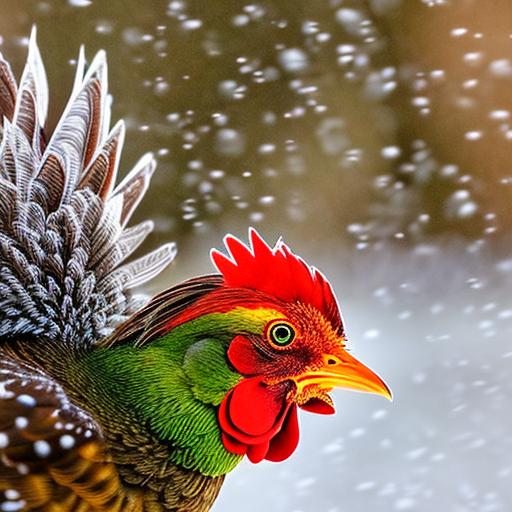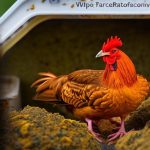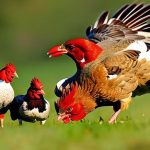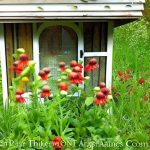Chickens are hardy animals that can withstand a wide range of temperatures, but they still have specific needs during the winter months. As the temperature drops, chickens require extra care to ensure their health and well-being. One of the most important aspects of winter chicken care is providing access to water. Water is essential for chickens to stay hydrated, regulate their body temperature, and maintain overall health.
During the winter, chickens may have difficulty finding water sources that are not frozen. This can lead to dehydration, which can have serious consequences for their health. Additionally, chickens need water to help them digest food properly and maintain egg production. Without access to water, chickens may become ill and their egg production may decline.
Key Takeaways
- Chickens need access to water in winter to maintain their health and egg production.
- Freezing water can be harmful to chickens and understanding the science behind it is important.
- Common methods for keeping chicken water from freezing include adding salt, using heated waterers, and insulating containers.
- Insulating water containers can help prevent freezing and keep water at a consistent temperature.
- Heating water with electric or solar devices, using warm water, and preventing spillage and splash can also help maintain healthy chickens in winter.
Why Chickens Need Access to Water in Winter
Water plays a crucial role in the health of chickens, regardless of the season. In winter, however, it becomes even more important due to the challenges posed by freezing temperatures. Chickens need water to stay hydrated and maintain their body temperature. Water helps regulate their internal body temperature and keeps them warm during cold weather.
Without access to water, chickens can become dehydrated, which can lead to a range of health issues. Dehydration can cause decreased egg production, weight loss, and even death in severe cases. Additionally, chickens need water to help them digest food properly. Lack of water can lead to digestive problems and impact their overall health.
Understanding the Science Behind Freezing Water
Water freezes at 32 degrees Fahrenheit (0 degrees Celsius), which poses a problem for chickens during winter. When water freezes, it becomes solid and inaccessible for drinking. This can be particularly challenging for chickens as they rely on a constant supply of fresh water.
Several factors can affect the freezing point of water. These include impurities in the water, such as minerals or contaminants, as well as external factors like wind chill. The presence of impurities can lower the freezing point of water, making it more likely to freeze at temperatures above 32 degrees Fahrenheit. Wind chill can also accelerate the freezing process by removing heat from the water more quickly.
Common Methods for Keeping Chicken Water from Freezing
| Method | Effectiveness | Cost | Difficulty |
|---|---|---|---|
| Heated Waterer | High | Easy | |
| Insulated Waterer | Medium | Easy | |
| Water Heater Base | High | Medium | |
| Heated Base | High | Easy | |
| Heated Hose | High | Medium |
There are several methods available to keep chicken water from freezing during winter. Traditional methods include using heated waterers and heated bases. Heated waterers are designed to keep the water warm enough to prevent freezing, while heated bases provide a source of heat from below to keep the water from freezing.
Heated waterers are convenient and easy to use. They typically have a built-in heating element that warms the water to prevent freezing. However, they can be expensive to purchase and may require electricity to operate. Additionally, they may not be suitable for large flocks or areas without access to electricity.
Heated bases, on the other hand, are a more affordable option. They consist of a heating element that is placed underneath a regular water container. The heat from the base rises and keeps the water above freezing temperature. Heated bases are versatile and can be used with various types of containers. However, they also require access to electricity and may not be as effective in extremely cold temperatures.
Insulating Water Containers to Prevent Freezing
Insulating water containers is another effective method for preventing freezing during winter. Insulation works by trapping heat and preventing it from escaping, keeping the water inside the container warm.
There are several DIY methods for insulating water containers. One option is to wrap the container with insulating materials such as foam or bubble wrap. This helps to create a barrier between the cold air and the water, reducing heat loss and preventing freezing.
Another method is to place the water container inside an insulated box or enclosure. This provides an extra layer of insulation and helps retain heat. The box or enclosure can be made from materials such as wood or Styrofoam.
Heating Water with Electric or Solar Devices
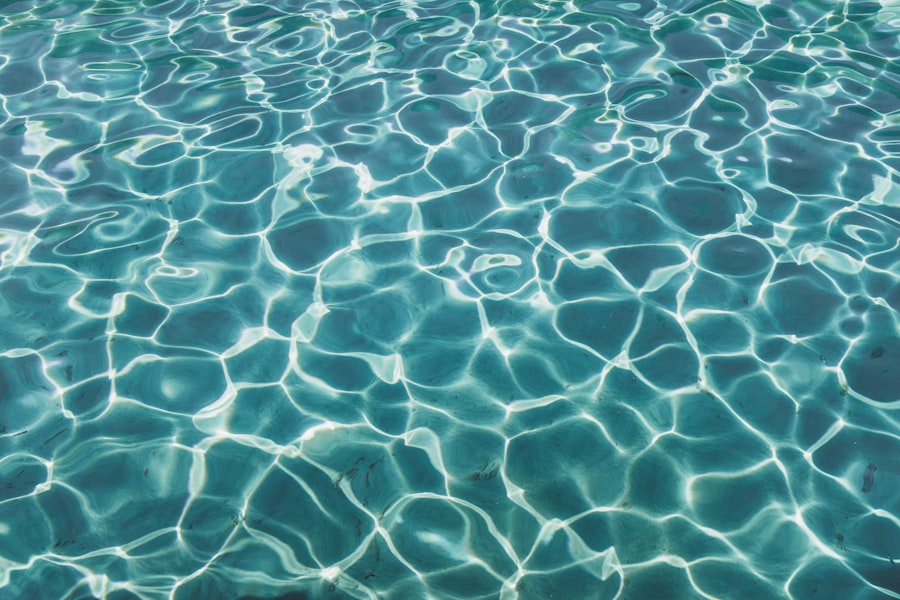
Electric and solar-powered water heaters are another option for keeping chicken water from freezing. Electric water heaters are similar to heated waterers, but they are typically larger and can accommodate larger flocks. They require access to electricity and may have higher upfront costs, but they provide a reliable source of heat to prevent freezing.
Solar-powered water heaters are a more sustainable option. They use solar energy to heat the water, eliminating the need for electricity. Solar-powered heaters can be more expensive upfront, but they can save on energy costs in the long run. They are also environmentally friendly and can be used in areas without access to electricity.
Using Warm Water to Prevent Freezing
Using warm water is another effective method for preventing freezing in chicken water containers. Warm water can help raise the overall temperature of the container, making it less likely to freeze.
It’s important to note that warm water should not be used as the sole method of preventing freezing. It should be used in conjunction with other methods, such as insulation or heating devices. Warm water can help maintain the temperature of the container, but it may not be enough to prevent freezing in extremely cold temperatures.
When using warm water, it’s essential to ensure that it is not too hot for the chickens to drink. Water that is too hot can cause burns or scalding. It’s best to use lukewarm water that is comfortable for human touch.
How to Prevent Water Spillage and Splash from Freezing
Spilled water can freeze quickly in cold temperatures, creating hazards for chickens. When water spills or splashes onto the ground or other surfaces, it can create slippery conditions that can lead to injuries.
To prevent spills and splashes from freezing, it’s important to ensure that water containers are secure and stable. Containers should be placed on a flat surface and secured to prevent tipping or spilling. Additionally, containers should be large enough to accommodate the needs of the flock without overflowing.
Regular cleaning and maintenance of water containers can also help prevent spills and splashes. Dirty or clogged containers can cause water to overflow or splash out, increasing the risk of freezing.
Tips for Monitoring Water Temperature and Quality
Monitoring water temperature and quality is crucial for maintaining the health of chickens during winter. Cold water can be unappealing to chickens and may discourage them from drinking enough. It’s important to ensure that the water is at a comfortable temperature for the chickens to drink.
Using a thermometer to check the water temperature regularly can help ensure that it is within an acceptable range. The ideal temperature for chicken drinking water is between 45-65 degrees Fahrenheit (7-18 degrees Celsius). If the water is too cold, it may be necessary to warm it slightly to encourage the chickens to drink.
In addition to temperature, it’s important to monitor the quality of the water. Chickens require clean, fresh water to stay healthy. Regularly check the water for any signs of contamination or debris. Clean and refill the water containers as needed to ensure a constant supply of clean water.
Maintaining Healthy Chickens in Winter
Providing access to water is essential for maintaining healthy chickens during winter. Water plays a crucial role in their overall health and well-being, helping them stay hydrated, regulate their body temperature, and maintain egg production.
There are several methods available for keeping chicken water from freezing, including heated waterers, heated bases, insulation, electric or solar-powered heaters, and using warm water. It’s important to choose a method that suits your specific needs and circumstances.
Regular monitoring of water temperature and quality is also important for ensuring that chickens have access to clean, fresh water. By taking these steps, you can help keep your chickens healthy and happy during the colder months.
If you’re a chicken owner, you know how important it is to keep their water from freezing during the winter months. It can be a challenge, but luckily there are solutions available. One helpful article on Poultry Wizard provides tips and tricks for preventing your chickens’ water from freezing. From using heated waterers to insulating your coop, this article covers everything you need to know. Check it out here to ensure your feathered friends have access to water all winter long.
FAQs
What is the article about?
The article is about keeping chickens’ water from freezing during the winter season.
Why is it important to keep chickens’ water from freezing?
It is important to keep chickens’ water from freezing because chickens need access to clean water at all times to stay healthy and hydrated.
What are some methods to keep chickens’ water from freezing?
Some methods to keep chickens’ water from freezing include using heated waterers, adding insulation to the waterer, using a heated base, and using a water heater.
What is a heated waterer?
A heated waterer is a waterer that has a built-in heating element that keeps the water from freezing.
What is a heated base?
A heated base is a device that is placed under the waterer to keep the water from freezing. It is plugged into an electrical outlet and heats the water from the bottom up.
What is a water heater?
A water heater is a device that is installed in the water line and heats the water as it flows through. It is typically used in larger chicken coops or farms.
What are some safety precautions to take when using heated waterers or bases?
Some safety precautions to take when using heated waterers or bases include keeping them away from flammable materials, ensuring that the electrical cords are not damaged, and keeping them out of reach of children and animals.
Meet Walter, the feathered-friend fanatic of Florida! Nestled in the sunshine state, Walter struts through life with his feathered companions, clucking his way to happiness. With a coop that’s fancier than a five-star hotel, he’s the Don Juan of the chicken world. When he’s not teaching his hens to do the cha-cha, you’ll find him in a heated debate with his prized rooster, Sir Clucks-a-Lot. Walter’s poultry passion is no yolk; he’s the sunny-side-up guy you never knew you needed in your flock of friends!

